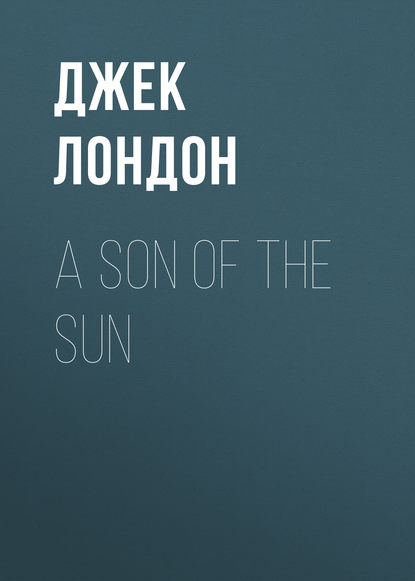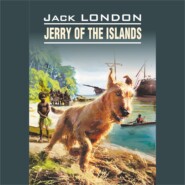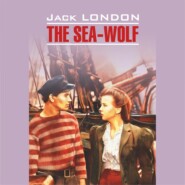По всем вопросам обращайтесь на: info@litportal.ru
(©) 2003-2024.
✖
A Son Of The Sun
Настройки чтения
Размер шрифта
Высота строк
Поля
“Washee-washee!” Grief cried to his boys. “You fella make-um beach quick fella time!”
In all shamelessness, he turned his back on the battle and ran for cover. The Willi-Waw, compelled to deaden way in order to pick up its captain, gave Grief his chance for a lead. The canoe struck the beach full-tilt, with every paddle driving, and they leaped out and ran across the sand for the trees. But before they gained the shelter, three times the sand kicked into puffs ahead of them. Then they dove into the green safety of the jungle.
Grief watched the Willi-Waw haul up close, go out the passage, then slack its sheets as it headed south with the wind abeam. As it went out of sight past the point he could see the topsail being broken out. One of the Gooma boys, a black, nearly fifty years of age, hideously marred and scarred by skin diseases and old wounds, looked up into his face and grinned.
“My word,” the boy commented, “that fella skipper too much cross along you.”
Grief laughed, and led the way back across the sand to the canoe.
III
How many millions David Grief was worth no man in the Solomons knew, for his holdings and ventures were everywhere in the great South Pacific. From Samoa to New Guinea and even to the north of the Line his plantations were scattered. He possessed pearling concessions in the Paumotus. Though his name did not appear, he was in truth the German company that traded in the French Marquesas. His trading stations were in strings in all the groups, and his vessels that operated them were many. He owned atolls so remote and tiny that his smallest schooners and ketches visited the solitary agents but once a year.
In Sydney, on Castlereagh Street, his offices occupied three floors. But he was rarely in those offices. He preferred always to be on the go amongst the islands, nosing out new investments, inspecting and shaking up old ones, and rubbing shoulders with fun and adventure in a thousand strange guises. He bought the wreck of the great steamship Gavonne for a song, and in salving it achieved the impossible and cleaned up a quarter of a million. In the Louisiades he planted the first commercial rubber, and in Bora-Bora he ripped out the South Sea cotton and put the jolly islanders at the work of planting cacao. It was he who took the deserted island of Lallu-Ka, colonized it with Polynesians from the Ontong-Java Atoll, and planted four thousand acres to cocoanuts. And it was he who reconciled the warring chief-stocks of Tahiti and swung the great deal of the phosphate island of Hikihu.
His own vessels recruited his contract labour. They brought Santa Cruz boys to the New Hebrides, New Hebrides boys to the Banks, and the head-hunting cannibals of Malaita to the plantations of New Georgia. From Tonga to the Gilberts and on to the far Louisiades his recruiters combed the islands for labour. His keels plowed all ocean stretches. He owned three steamers on regular island runs, though he rarely elected to travel in them, preferring the wilder and more primitive way of wind and sail.
At least forty years of age, he looked no more than thirty. Yet beachcombers remembered his advent among the islands a score of years before, at which time the yellow mustache was already budding silkily on his lip. Unlike other white men in the tropics, he was there because he liked it. His protective skin pigmentation was excellent. He had been born to the sun. One he was in ten thousand in the matter of sun-resistance. The invisible and high-velocity light waves failed to bore into him. Other white men were pervious. The sun drove through their skins, ripping and smashing tissues and nerves, till they became sick in mind and body, tossed most of the Decalogue overboard, descended to beastliness, drank themselves into quick graves, or survived so savagely that war vessels were sometimes sent to curb their license.
But David Grief was a true son of the sun, and he flourished in all its ways. He merely became browner with the passing of the years, though in the brown was the hint of golden tint that glows in the skin of the Polynesian. Yet his blue eyes retained their blue, his mustache its yellow, and the lines of his face were those which had persisted through the centuries in his English race. English he was in blood, yet those that thought they knew contended he was at least American born. Unlike them, he had not come out to the South Seas seeking hearth and saddle of his own. In fact, he had brought hearth and saddle with him. His advent had been in the Paumotus. He arrived on board a tiny schooner yacht, master and owner, a youth questing romance and adventure along the sun-washed path of the tropics. He also arrived in a hurricane, the giant waves of which deposited him and yacht and all in the thick of a cocoanut grove three hundred yards beyond the surf. Six months later he was rescued by a pearling cutter. But the sun had got into his blood. At Tahiti, instead of taking a steamer home, he bought a schooner, outfitted her with trade-goods and divers, and went for a cruise through the Dangerous Archipelago.
As the golden tint burned into his face it poured molten out of the ends of his fingers. His was the golden touch, but he played the game, not for the gold, but for the game’s sake. It was a man’s game, the rough contacts and fierce give and take of the adventurers of his own blood and of half the bloods of Europe and the rest of the world, and it was a good game; but over and beyond was his love of all the other things that go to make up a South Seas rover’s life – the smell of the reef; the infinite exquisiteness of the shoals of living coral in the mirror-surfaced lagoons; the crashing sunrises of raw colours spread with lawless cunning; the palm-tufted islets set in turquoise deeps; the tonic wine of the trade-winds; the heave and send of the orderly, crested seas; the moving deck beneath his feet, the straining canvas overhead; the flower-garlanded, golden-glowing men and maids of Polynesia, half-children and half-gods; and even the howling savages of Melanesia, head-hunters and man-eaters, half-devil and all beast.
And so, favoured child of the sun, out of munificence of energy and sheer joy of living, he, the man of many millions, forbore on his far way to play the game with Harrison J. Griffiths for a paltry sum. It was his whim, his desire, his expression of self and of the sun-warmth that poured through him. It was fun, a joke, a problem, a bit of play on which life was lightly hazarded for the joy of the playing.
IV
The early morning found the Wonder laying close-hauled along the coast of Guadalcanal She moved lazily through the water under the dying breath of the land breeze. To the east, heavy masses of clouds promised a renewal of the southeast trades, accompanied by sharp puffs and rain squalls. Ahead, laying along the coast on the same course as the Wonder, and being slowly overtaken, was a small ketch. It was not the Willi-Waw, however, and Captain Ward, on the Wonder, putting down his glasses, named it the Kauri.
Grief, just on deck from below, sighed regretfully.
“If it had only been the Willi-Waw” he said.
“You do hate to be beaten,” Denby, the supercargo, remarked sympathetically.
“I certainly do.” Grief paused and laughed with genuine mirth. “It’s my firm conviction that Griffiths is a rogue, and that he treated me quite scurvily yesterday. ‘Sign,’ he says, ‘sign in full, at the bottom, and date it,’ And Jacobsen, the little rat, stood in with him. It was rank piracy, the days of Bully Hayes all over again.”
“If you weren’t my employer, Mr. Grief, I’d like to give you a piece of my mind,” Captain Ward broke in.
“Go on and spit it out,” Grief encouraged.
“Well, then – ” The captain hesitated and cleared his throat. “With all the money you’ve got, only a fool would take the risk you did with those two curs. What do you do it for?”
“Honestly, I don’t know, Captain. I just want to, I suppose. And can you give any better reason for anything you do?”
“You’ll get your bally head shot off some fine day,” Captain Ward growled in answer, as he stepped to the binnacle and took the bearing of a peak which had just thrust its head through the clouds that covered Guadalcanar.
The land breeze strengthened in a last effort, and the Wonder, slipping swiftly through the water, ranged alongside the Kauri and began to go by. Greetings flew back and forth, then David Grief called out:
“Seen anything of the Willi-Waw?”
The captain, slouch-hatted and barelegged, with a rolling twist hitched the faded blue lava-lava tighter around his waist and spat tobacco juice overside.
“Sure,” he answered. “Griffiths lay at Savo last night, taking on pigs and yams and filling his water-tanks. Looked like he was going for a long cruise, but he said no. Why? Did you want to see him?”
“Yes; but if you see him first don’t tell him you’ve seen me.”
The captain nodded and considered, and walked for’ard on his own deck to keep abreast of the faster vessel.
“Say!” he called. “Jacobsen told me they were coming down this afternoon to Gabera. Said they were going to lay there to-night and take on sweet potatoes.”
“Gabera has the only leading lights in the Solomons,” Grief said, when his schooner had drawn well ahead. “Is that right, Captain Ward?”
The captain nodded.
“And the little bight just around the point on this side, it’s a rotten anchorage, isn’t it?”
“No anchorage. All coral patches and shoals, and a bad surf. That’s where the Molly went to pieces three years ago.”
Grief stared straight before him with lustreless eyes for a full minute, as if summoning some vision to his inner sight. Then the corners of his eyes wrinkled and the ends of his yellow mustache lifted in a smile.
“We’ll anchor at Gabera,” he said. “And run in close to the little bight this side. I want you to drop me in a whaleboat as you go by. Also, give me six boys, and serve out rifles. I’ll be back on board before morning.”
The captain’s face took on an expression of suspicion, which swiftly slid into one of reproach.
“Oh, just a little fun, skipper,” Grief protested with the apologetic air of a schoolboy caught in mischief by an elder.
Captain Ward grunted, but Denby was all alertness.
“I’d like to go along, Mr. Grief,” he said.
Grief nodded consent.
“Bring some axes and bush-knives,” he said. “And, oh, by the way, a couple of bright lanterns. See they’ve got oil in them.”
V
An hour before sunset the Wonder tore by the little bight. The wind had freshened, and a lively sea was beginning to make. The shoals toward the beach were already white with the churn of water, while those farther out as yet showed no more sign than of discoloured water. As the schooner went into the wind and backed her jib and staysail the whaleboat was swung out. Into it leaped six breech-clouted Santa Cruz boys, each armed with a rifle. Denby, carrying the lanterns, dropped into the stern-sheets. Grief, following, paused on the rail.
“Pray for a dark night, skipper,” he pleaded.
“You’ll get it,” Captain Ward answered. “There’s no moon anyway, and there won’t be any sky. She’ll be a bit squally, too.”
The forecast sent a radiance into Grief’s face, making more pronounced the golden tint of his sunburn. He leaped down beside the supercargo.
“Cast off!” Captain Ward ordered. “Draw the headsails! Put your wheel over! There! Steady! Take that course!”
The Wonder filled away and ran on around the point for Gabera, while the whaleboat, pulling six oars and steered by Grief, headed for the beach. With superb boatmanship he threaded the narrow, tortuous channel which no craft larger than a whaleboat could negotiate, until the shoals and patches showed seaward and they grounded on the quiet, rippling beach.

















